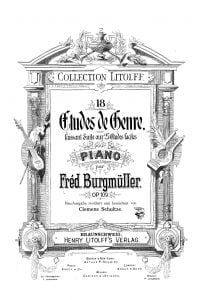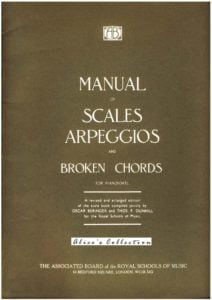Table of Contents
Burgmüller: Étude Die Dramatische Op. 105 No 2 La Dramatique sheet music, Noten, partitura, partition, spartiti.

Best Sheet Music download from our Library.

Please, subscribe to our Library.
If you are already a subscriber, please, check our NEW SCORES’ page every month for new sheet music. THANK YOU!

Burgmüller
Johann Friedrich Franz Burgmüller, generally known as Friedrich Burgmuller (4 December 1806 – 13 February 1874) was a German pianist and composer[1] during the Romantic period. He is perhaps best known for his three collections of children’s etudes (or “teaching pieces”) for the piano, particularly his Op. 100 “25 Études faciles et progressives” (25 Easy and Progressive Studies) for early intermediate students. The other two collections, for more advanced students, were Op. 105 and 109.

Friedrich Burgmüller was born in Ratisbon (at that time part of the Principality of Regensburg, Confederation of the Rhine). His father Friedrich August Burgmüller and his younger brother Norbert Burgmüller were also composers. His mother was pianist and singer Therese von Zandt.
He moved to Kassel in 1829 to study with Ludwig Spohr and Moritz Hauptmann. There he appeared as a pianist for his first concert, January 14, 1830.
Burgmüller moved to Paris in 1832 (at age 26 ), where he stayed until his death. Norbert Burgmüller, his brother, made plans to join him in Paris, in 1835. However, he drowned in a spa in Aachen during an epileptic seizure a year later. In Paris, Burgmüller adopted Parisian music and developed his trademark (light) style of playing. He wrote many pieces of salon music for the piano and published several albums. Burgmüller also went on to compose piano études intended for children. He died in Paris on February 13, 1874.
Burgmüller composed piano pieces, waltzes, nocturnes, polonaises and two ballets. His Peasant Pas de Deux was added to Adolphe Adam’s ballet Giselle for its 1841 premiere. This music was originally titled Souvenirs de Ratisbonne.
He is perhaps best known for his etudes and other work for piano students. In particular, selections from his Op. 68, 76, 100, and 105, as well as his ‘Ballad’ appear in a wide variety of educational collections. In addition to these piano pieces, he composed works without opus numbers, including variations, waltzes, nocturnes, and polonaises. He composed works for chamber orchestra and two ballets: La Péri and Lady Harriet.

In his time he was famous for his numerous productions of ballroom dances and ballets, which have fallen into oblivion today. On the contrary, his opus 100, which consists of twenty-five easy studies, is highly appreciated in piano studies, at the conservatory level. Typically five or six pieces are performed: La candeur, Innocence, Arabesques, Douce Plainte, Inquietude and Progresse.
Works with opus numbers
6 Mélodies gracieuses de Bellini, Op. 26
Souvenir de Bellini, Op. 27
Souvenir de Schönbrunn, Op. 32
La Cachucha, Op. 36
Murmures du Rhone, Op. 66
Corbeille de roses, Op. 68
Fleurs mélodiques, Op. 82
Fantaisie brillante sur "Ernani" de Verdi, Op. 92
Blaue Äuglein, Op. 93
Les Étincelles, Op. 97
25 Études faciles et progressives, Op. 100
12 Études, Op. 105
18 Études, Op. 109Without opus numbers
L'Ange consolateur
Ay Chiquita
3 Nocturnes, for cello and guitar
Le Pardon de Ploërmel
La Péri
Souvenirs de Londres
BalladeBrowse in the Library:
Or browse in the categories menus & download the Library Catalog PDF:
